Israeli visitors flock to this city in northern Thailand
The Jewish News of Greater Phoenix — January 11, 2013
CHIANG MAI, Thailand – As I walked past the Shangri-La Hotel on Chang Klan Road in downtown Chiang Mai, I started wondering if my sunglasses had fogged up, distorting my vision.
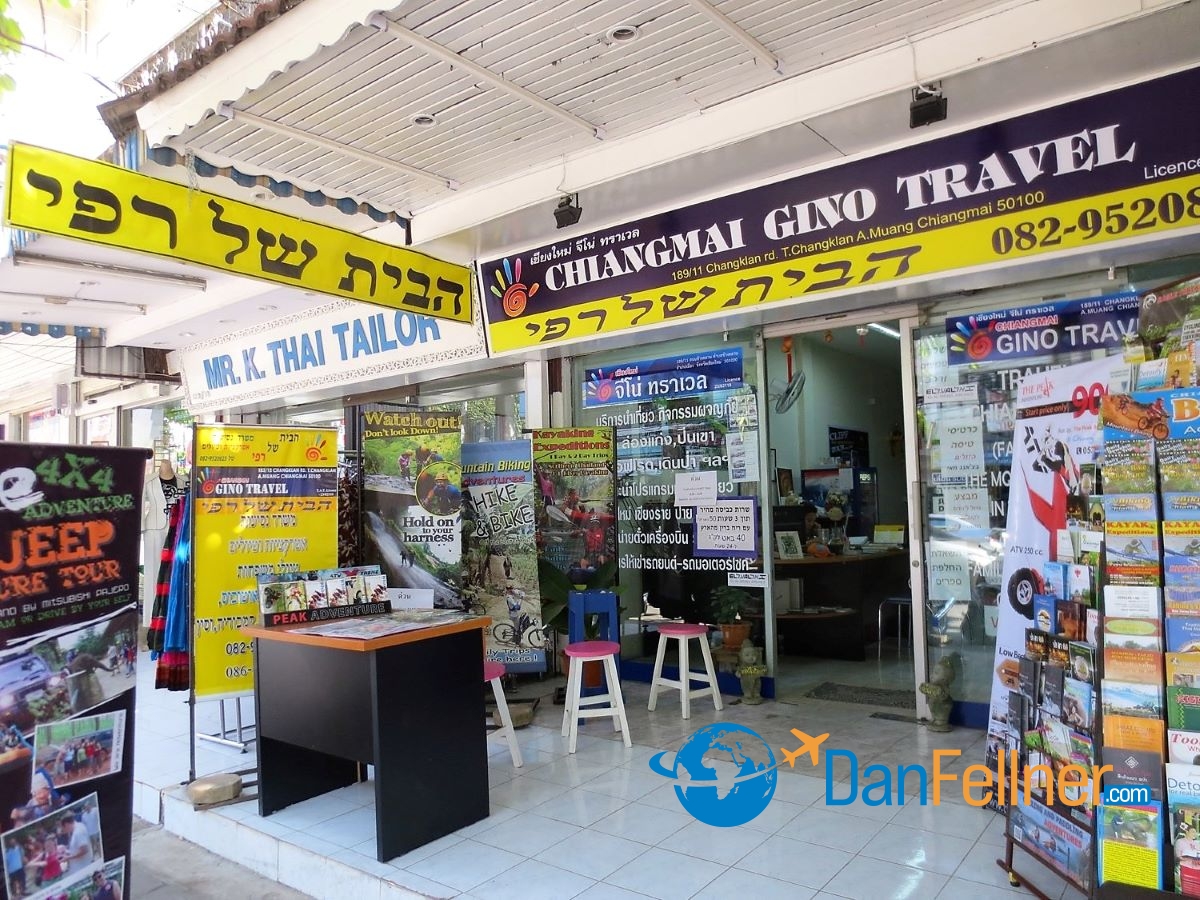
An Israel-owned business in Chiang Mai’s Jewish neighborhood.
There were at least a half-dozen stores along a couple of blocks – restaurants and travel agencies – with signs that appeared to be in Hebrew. The Thai alphabet bears at least a little resemblance to Hebrew, and I took a closer look to see if my eyes were playing tricks on me.
Yes, it really was Hebrew.
Turns out that Chiang Mai — a popular tourist destination in northern Thailand and the former capital of the ancient Lanna kingdom — has a Jewish neighborhood. Who knew?
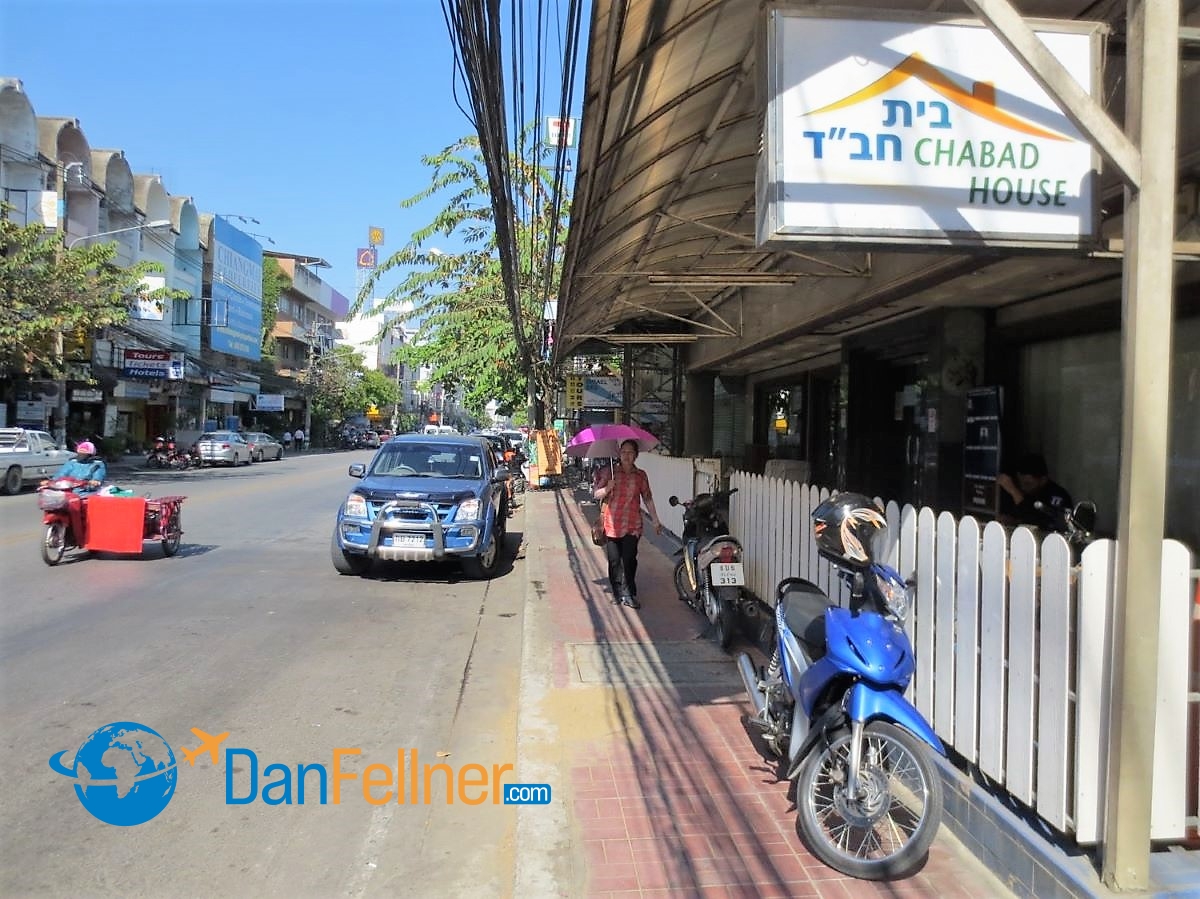
Chiang Mai’s busy Chabad House.
During my recent three-day visit to Chiang Mai as part of a 12-day trip to Thailand, Laos and Myanmar, I learned that Jewish life in the city is fueled by a huge influx of Israeli tourists as well as a surprisingly large community of several hundred Jewish expats.
I went inside one of the businesses with Hebrew signage, a travel agency called “Israel 669” (named after an elite Israeli military unit). The owner, Israel Yehoshua, told me that there are at least seven Jewish-owned businesses on the street that primarily cater to vacationing Israelis.
Thailand has become a magnet for Israeli travelers, who love the country’s warm weather, cheap prices, historic sites, jungle-trekking, nightlife and beaches. Many of them arrive on daily nonstop flights from Tel Aviv to Bangkok, the country’s capital and largest city.
Yehoshua estimates that about 120,000 Israelis visit Thailand every year. Of those, he said, about 30 percent find their way 470 miles north of Bangkok to Chiang Mai. The city’s name, pronounced Chang My, means “new city” in Thai, so named because it became the capital of the Kingdom of Lanna in 1296, the year Chiang Mai was founded. It now has a population of about 170,000.
Chiang Mai is a bit cooler than Bangkok, more relaxed and offers visitors a myriad of adventures. During my stay, I took an elephant ride through the jungle, cruised down a river on a bamboo raft, rode an ox cart, and explored several small villages inhabited by hill tribes.

The author with Rabbi Yosef Pikel inside the Chabad sanctuary in Chiang Mai, Thailand.
I was especially fascinated with a subgroup of the Karen tribe called the Padaung. These people, who moved to Thailand from neighboring Myanmar, are known as the “long-neck” tribe because their females wear brass rings around their necks. This gives the illusion that they have unusually long necks, considered a sign of great beauty in their culture.
Two doors down from Yehoshua’s travel agency, I entered the Chabad House, the hub of Jewish life in Chiang Mai. Rabbi Yosef Pikel, who moved to Chiang Mai four years ago from Israel and lives there with his wife and three children, said that Friday night Shabbat services and dinner typically attract between 100-200 people.
Rosh Hashanah services last fall had so many visitors – 550 – that Chabad had to rent a ballroom in a local hotel to accommodate the crowd.
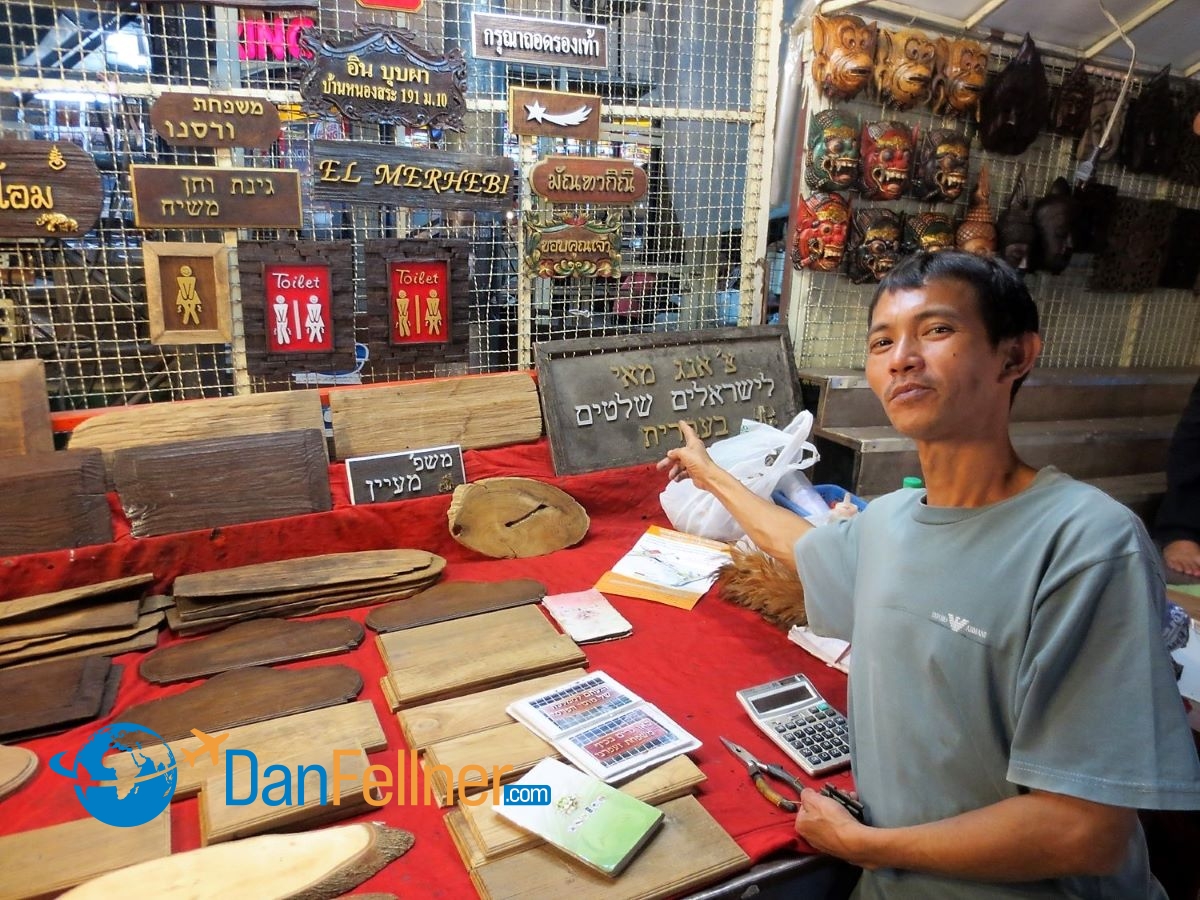
Hebrew signs for sale in the Chiang Mai Night Bazaar.
A kosher restaurant in the Chabad House serves about 150 meals a day. A small store on the premises sells kosher food products. A few blocks away there is a mikvah, or ritual bath.
Pikel said 85 percent of Chabad’s more than 10,000 visitors each year are Israelis, with most of the rest coming from France, England, America and Australia.
The rabbi said there are so many Israeli visitors in Chiang Mai that many Thai vendors have picked up a few words of Hebrew slang, like achi (“my brother”) to woo shoppers. Indeed, at the city’s famous Night Bazaar, I saw one vendor selling wooden signs, a number of which were engraved in Hebrew.
What’s it like being the rabbi in a community in which most of the Jews are just passing through? Pikel said there are pros and cons.

Bamboo rafting near Chiang Mai.
“You meet many interesting people,” he said. “But you only meet them for a short time. As a rabbi, if you want to give something back to people, you have a very short time to do it.”
During my visit, I also met Barry Wasserzug, a Canadian Jew who has lived in Chiang Mai since 2009. Wasserzug estimates that 400-500 Jewish ex-pats live in the area, about half of whom are American.
“In my condo building alone, there are at least 15-20 Jews,” he said.
Wasserzug organizes informal events for Chiang Mai’s resident Jews, most of whom he says are not especially religious and rarely attend services at Chabad. A potluck Hanukah party at his home the week before I arrived – featuring homemade potato latkes – was attended by 40 people.
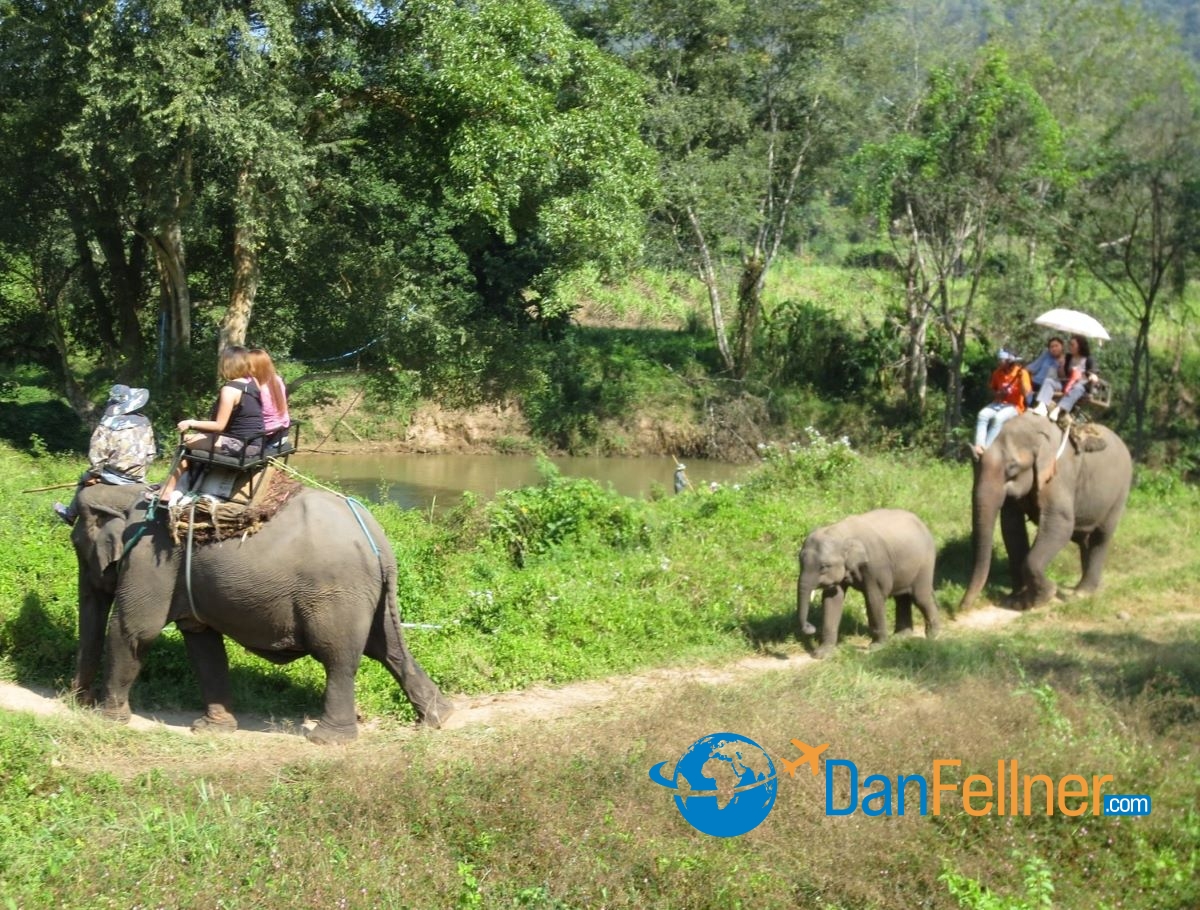
One of several elephant parks near Chiang Mai, Thailand.
The retired jeweler, who lived in Scottsdale for three years back in the 1970s, said he was vacationing in Chiang Mai a few years ago and became intrigued with the idea of living there. He hasn’t regretted making the move from Toronto.
“It suits me,” said Wasserzug. “It’s warm, there’s no snow, it’s safe, it’s clean. There’s good medical; the cost of living is low. Most people are living on $1,000-$1,500 a month, some less.”
Pikel said he is working to forge stronger ties between Chabad and the Jewish expat community. Last year, he hosted a second-night seder at his home, which was attended by 40 Americans.
During my final morning in Chiang Mai, I was eating breakfast at my small hotel on the outskirts of town and noticed a bookcase with about a dozen travel guides.
One of the books was Lonely Planet’s Thailand. It was the Hebrew version.
Somehow, I wasn’t surprised.
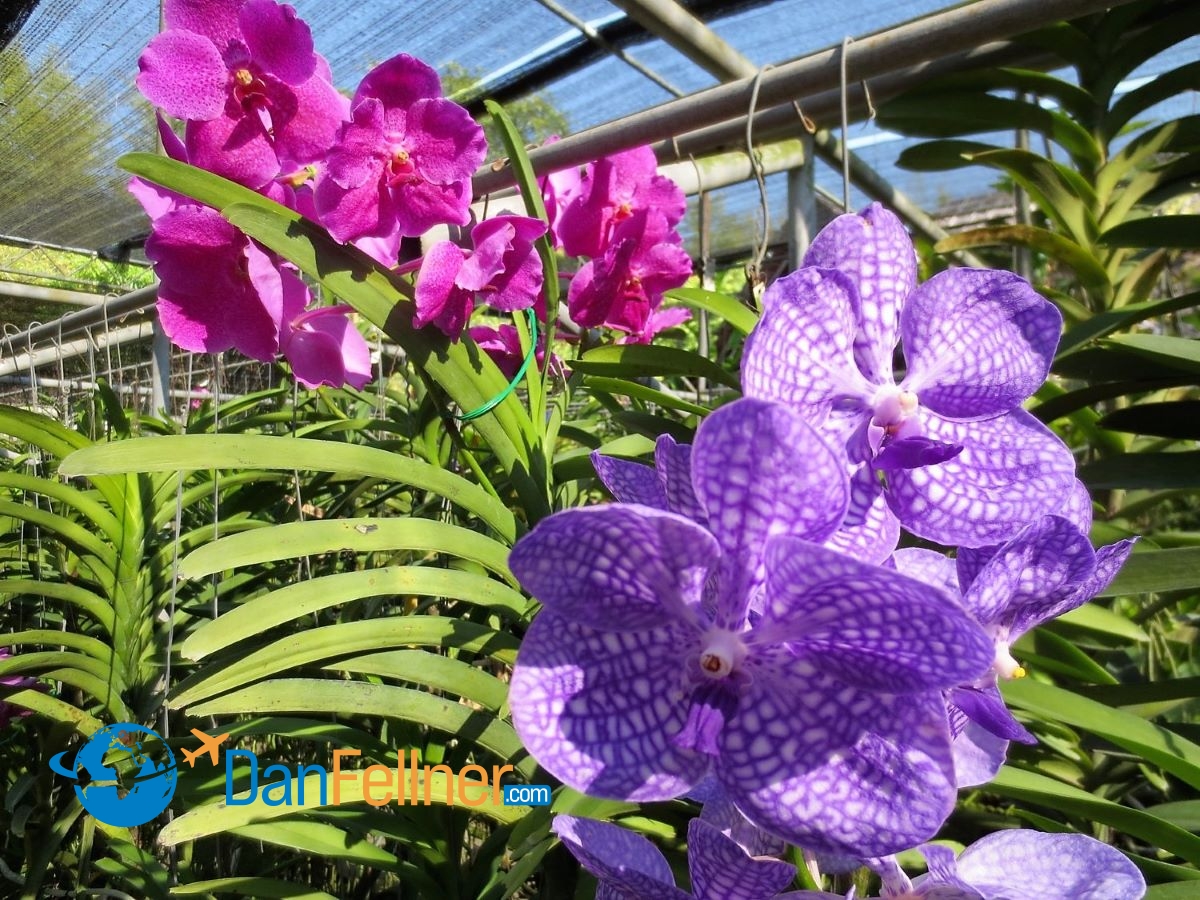
The Bai Orchid-Butterfly Farm in Chiang Mai, Thailand.
© 2013 Dan Fellner

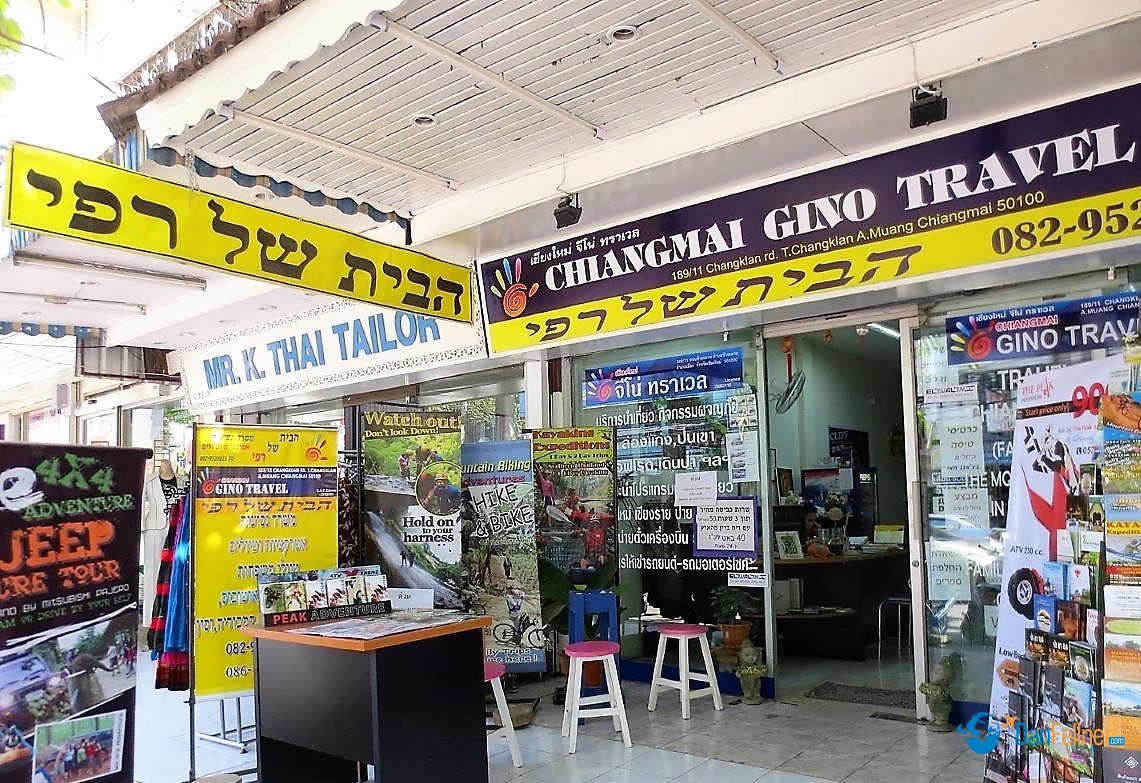
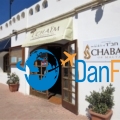

1 Comment
J ay classel
That was a great article. Hope I get a chance to read some of your other articles!
Comments are Closed.